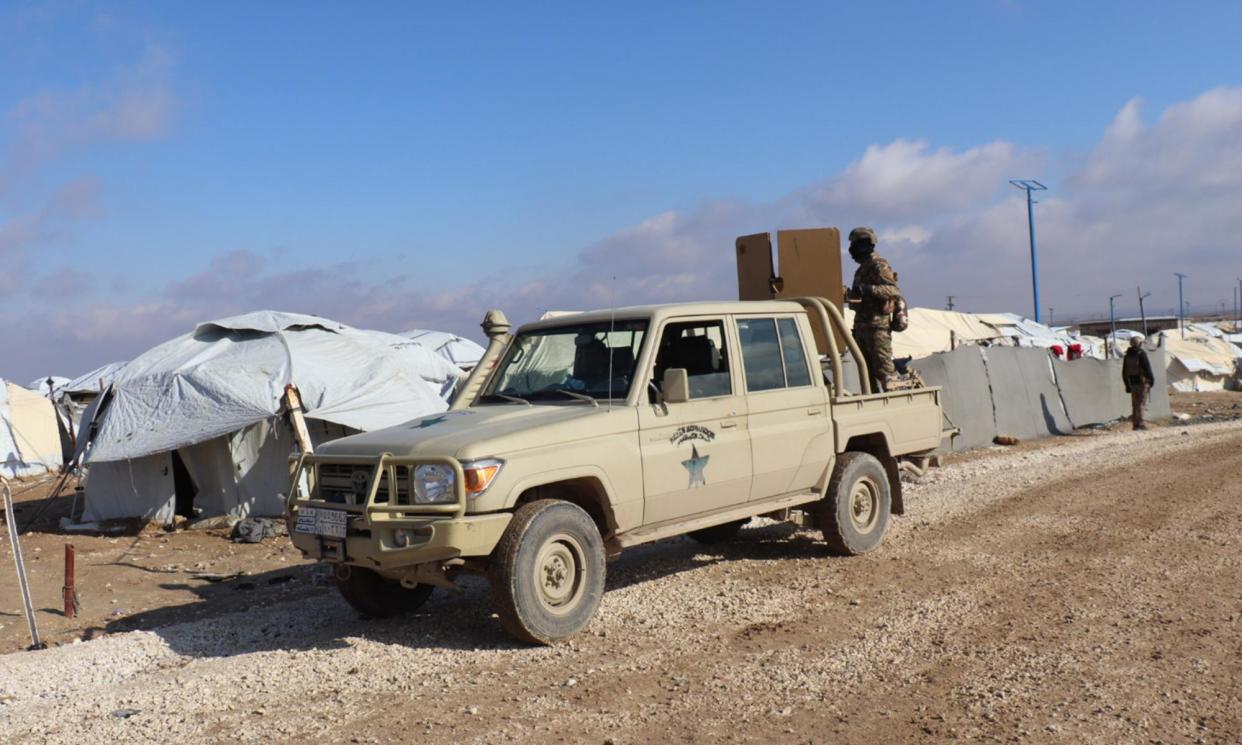US-backed Kurdish fighters killed in drone strike on US base in Syria

At least six US-backed Kurdish fighters have been killed in a drone strike on a US base in eastern Syria. The attack was claimed by an Iranian-backed militia that was the target of US airstrikes on Friday.
The deaths are the latest indicator of how conflict is seeping across the Middle East since the beginning of the war in Gaza, with ever less predictable consequences for regional stability.
The Kurdish-led Syrian Democratic Forces (SDF), which have fought Islamic State (IS) jihadists in Syria, said six of their fighters were killed in an attack on their commando academy at a US base at al-Omar oilfield in Syria’s eastern Deir ez-Zor province.
A further 18 were wounded. A UK-based monitor, the Syrian Observatory for Human Rights, put the death toll at seven.
The attack was claimed by the Islamic Resistance in Iraq (IRI), which was among the subjects of a US-led attackstrike last week in reprisal for its killing of three US soldiers in a drone strike on a US base in Jordan. The group is a loose alliance of pro-Iran fighters opposed to US presence in Syria and Iraq.
Al-Omar is the largest base in Syria of a US-led coalition including the SDF that was set up in 2014 to fight IS after the Sunni jihadists captured swathes of Iraq and neighbouring Syria.
Operating under the banner of Operation Inherent Resolve, about 2,500 US troops are still deployed in Iraq and about 900 in Syria, where Bashar al-Assad, backed by Russia and Iran, still does not control large tracts of the country since the civil war that began in 2011.
The SDF are the de facto army of the Kurdish administration that control an area of Syria’s north-east they call Rojava.
They said in a statement: “Six of our fighters were martyred during a terrorist attack by a suicide plane originating from areas controlled by Syrian regime mercenaries, targeting a training academy in the al-Omar field east of Deir ez-Zor.”
The US national security adviser, Jake Sullivan, said at the weekend the attacks on Iranian-backed militia including the IRI and Tehran’s Revolutionary Guard represented the launch of a multi-layered assault designed to weaken their ability to hit US service personnel after the 27 January attack on the Jordan base.
Friday’s strikes hit more than 85 targets, though damage was likely to have been reduced by the near week-long warning that US strikes were imminent.
Retired colonel Joe Buccino, a former US military spokesperson, said at the weekend he believed the US attacks were unlikely to be effective. “These Shia groups that we hit in Iraq and Syria – they will be able to replenish the rockets and the drones and the structures that we hit in the next several weeks, so this will really accomplish nothing.
“The Biden administration, President Biden, is very risk-averse, and feels like if we take a real strike, if we make Iran feel some real pain, this will go into a wider war.”
He claimed the political effect of the strikes was likely to increase the demands inside Iraq for the US troops to leave.
The Iranian foreign ministry spokesperson, Nasser Kanaani, said at his weekly press conference on Monday that Tehran was not seeking an escalation. He said the US “attacking other countries is a violation of the national sovereignty of Syria, Iraq and Yemen and is a clumsy attempt to divert the public mind from the focal point of the Palestinian crisis to other directions”.
The US secretary of state, Antony Blinken, met Saudi Arabia’s de-facto ruler, Crown Prince Mohammed bin Salman, on Monday at the start of a Middle East tour. He will also visit Egypt, Qatar, Israel and the West Bank in a push to advance a deal to free the more than 130 hostages held in Gaza.
Their possible release by Hamas in return for a humanitarian pause is among the issues under discussion in talks mediated by Qatar and Egypt with US backing. Officials have noted some progress, but say that gaps remain.
US forces said on Sunday that they had destroyed four anti-ship cruise missiles that Houthi fighters were preparing for launch. Hussein al-Ezzi, the deputy foreign minister for the Houthi administration based in Sana’a, said the group was not firing at commercial shipping in general, but only Israeli ships or US naval forces protecting Israeli shipping.
The UK defence secretary, Grant Shapps, told MPs that Saturday’s joint US-UK strikes on Houthi positions had achieved their objectives. He said attacks on British ships were now more sporadic and less sophisticated, and described the Houthis as “opportunist pirates” who had no interest in supporting Gaza.
The western-backed government based in Aden underwent a reshuffle, in which the foreign minister, Ahmed bin Mubarak, a hardline opponent of the Houthis, was appointed prime minister. Close to Saudi Arabia, he wants the EU to help the Yemeni government by building up its military forces and declaring the Houthis a terrorist group.
The Houthis also said Italy would become a target if it took part in attacks against Yemen after Rome said on Friday that it would provide the admiral in command of a EU Red Sea naval mission it had joined to protect ships from attacks by the militia.
The mandate of the mission, to be launched in mid-February, will be to protect commercial ships and intercept attacks, but not take part in strikes against the Houthis, according to the EU’s foreign policy chief, Josep Borrell.

 Yahoo News
Yahoo News 